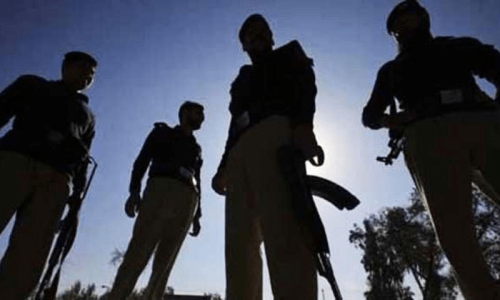NEW DELHI, Dec 14: The Chief Justice of India has counselled restraint in the concept of hot pursuit in cross-border hunt for terrorists, advocating instead a new legal definition for terrorism that could boost international cooperation, instead of violating sovereignty of maligned nations.
“From our recent experience, we have learnt that terrorist attacks against innocent and unsuspecting civilians threaten the preservation of rule of law as well as human rights and terrorism can broadly be identified with the use of violent methods in place of the ordinary tools of civic engagement and political participation,” Justice K.G. Balakrishnan told an international conference on human rights on Saturday.
He said that while the conduct and consequences of armed conflicts between nations — such as wars and border-skirmishes — were regulated by international criminal law and humanitarian law, the occurrence of internal disturbances within a nation were largely considered to be the subject-matter of that particular nation’s domestic criminal justice system and constitutional principles.
“In the absence of bilateral treaties for extradition or assistance in investigation, there is no clear legal basis for international cooperation in investigating terrorist attacks — which are usually classified as internal disturbances in the nation where they took place. Since there are no clear and consistent norms to guide collaboration between nations in acting against terrorists, countries like the United States have invented their own doctrines such as ‘pre-emptive action’ to justify counter-terrorism operations in foreign nations,” Justice Balakrishnan told the meeting, which was attended also by Prime Minister Manmohan Singh.
However, he added, “the pursuit of terrorists alone cannot be a justification for arbitrarily breaching another nation’s sovereignty.
In this scenario, one strategy that has been suggested is that of recognising terrorist attacks as coming within a new ‘hybrid’ category of armed conflict, wherein obligations can be placed on different countries to collaborate in the investigation and prosecution of terrorist attacks that have taken place in a particular country. This calls for a blurring of the distinction between the international and domestic nature of armed conflict when it comes to terrorist strikes.”
A practical constraint that has been brought to the fore with the Mumbai attacks has been the question of holding governments responsible for the actions of non-state actors.
“While one can say that there is a moral duty on all governments to prevent and restrain the activities of militant groups on their soil, the same is easier said than done,” the head of India’s Supreme Court said. For example, he said, several terrorist groups are able to organise financial support and procure weapons even in Western nations where it is perceived that policing and criminal justice systems are relatively stronger than the Subcontinent.
Justice Balakrishnan voiced concern at the controversial media coverage of the Mumbai terror attack.
“The symbolic impact of terrorist attacks on the minds of ordinary citizens has also been considerably amplified by the role of pervasive media coverage. One of the ill-effects of unrestrained coverage is that of provoking anger amongst the masses,” he said.
He warned that the trauma resulting from the terrorist attacks may be used as a justification for undue curtailment of individual rights and liberties.
“Instead of offering a considered response to the growth of terrorism, a country may resort to questionable methods such as permitting indefinite detention of terror suspects, the use of coercive interrogation techniques and the denial of the right to fair trial.”
The remarks are being seen as criticism of advocacy by a former BJP minister to not allow legal help to alleged terrorists.
“Outside the criminal justice system, the fear generated by terrorist attacks may also be linked to increasing governmental surveillance over citizens and unfair restrictions on immigration,” Justice Balakrishnan observed.
“In recent years, the most prominent example of this ‘slippery-slope’ for the curtailment of individual rights is the treatment of the detainees in Guantanamo Bay who were arrested by US authorities in the wake of the 9/11 attacks.”
With the Mumbai attacks fresh in public mind Justice Balakrishnan’s comments were inevitably reflective of the impact it had on the response of the thinking judges.
“The apprehension and interrogation of terror suspects must also be done in a thoroughly professional manner, with the provision of adequate judicial scrutiny as mandated in the Code of Criminal Procedure.”
This was required, the judge said, because in recent counter-terrorist operations, there have been several reports of arbitrary arrests of individuals belonging to certain communities and the concoction of evidence – such as the production of similarly worded confession statements by detained suspects in different places.
“The proposal for the admissibility of confessional statements made before the police is also problematic since there are fears that such a change will incentivise torture and coercive interrogation by investigative agencies in order to seek convictions rather than engaging in thorough investigation.”Adherence to the constitutional principle of ‘substantive due process’ was an essential part of our collective response to terrorism.
“As part of the legal community, we must uphold the right to fair trial for all individuals, irrespective of how heinous their crimes may be. If we accept a dilution of this right, it will count as a moral loss against those who preach hatred and violence.”















































Dear visitor, the comments section is undergoing an overhaul and will return soon.